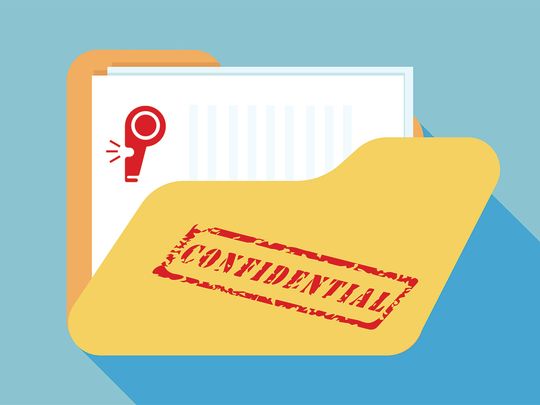
Financial frauds are a burgeoning menace in the corporate landscape.
A broad overview of stats reveals how essential it is for businesses to get a grip on keeping financial frauds and risks at bay. As per an industry study on the cost of fraud in Europe, Middle East and Africa, 42 per cent of companies in the UAE reported an increase in fraud over a period of one year.
It is estimated organizations incur an average cost of Dh4.19 (Dh3.62 for retailers and Dh4.99 for financial institutions) for every dirham lost to fraud. With more than $800 billion laundered every year financial crime risks are expected to be on the rise and AI driven fraudulent activities are gaining momentum within businesses.
How can a whistleblowing policy help a business?
Implementing an effective whistle-blowing policy is a need, to reduce fraudulent financial risks to some extent. The UAE Penal Code requires all individuals to report criminal activity in the UAE - however this practice is not rigorously enforced.
Whistleblower protection has gained significant prominence in the UAE regulatory landscape and the benefits of bringing this policy into the business ecosystem cannot be endorsed enough.
- Timely identification of wrongdoing can prevent issues from snowballing into massive damages owing to effective whistle-blowing policies that empower employees to report unethical behavior within the organization.
- Implementing whistle-blowing policy highlights organizational transparency and accountability, thereby curating an environment where concerns can be raised without the fear of retaliation – in the best interests of the business.
- Protecting stakeholder interests is a possibility when unethical behavior is promptly addressed. These go a long way in protecting the interests of various stakeholders, including customers, shareholders, employees, and the community at large.
- Legal compliance is adhered to when businesses have a whistle-blowing policy in place as many regulatory bodies require organizations to implement mechanisms that help in reporting unethical behavior.
- Preserving organizational reputation requires ethical issues to be handled with confidentiality and care. Implementation of a policy ensures long-lasting negative effects on brand value and reputation can be mitigated.
- A well-implemented whistle-blowing policy creates an organizational culture that deters unethical behavior and encourages addressing disclosures made in the best interests of the organization.
- A business that endorses the practice of a whistle-blowing policy wins the implicit trust of its employees through organizational leadership, leading to higher employee engagement and retention rates.
Encourage whistle blowing for best interest of your business
Inclusivity must be central to the organizational culture encouraging employees to speak up and flag potential fraud concerns. Creating portals that enable active reporting system are bound to ensure confidentiality within the organization, there by encouraging instances of whistle blowing.
It is imperative to note that whistle-blowing alerts can come from diverse sources and contacts engaging with the business across various levels. Stakeholders must be open to receiving such alerts from vendors, consultants, or third-party sources. A system within the business helps minimize frauds and risks before the matter escalates at a regulatory or financial scale.
Establishing a robust whistle-blowing strategy backed by effective policies and procedures is significant in assessing regulatory concerns and avoiding deliberate false disclosures. Businesses stand to benefit as it ensures the regulatory foundation is in place to protect their best interests.













